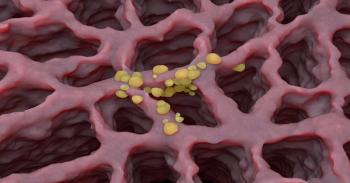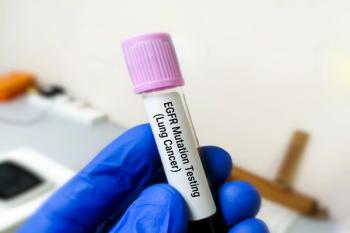
Non-Small Cell Lung Cancer
Latest News
Latest Videos

CME Content
More News

Should the FDA require that new trial design proposals for perioperative regimens for resectable non–small cell lung cancer (NSCLC) include adequate within trial assessment?

Patients with unresectable stage III non–small cell lung cancer (NSCLC) who received atezolizumab before and after chemoradiation therapy (CRT) had both safe and effective results.

A key opinion leader examines the overall survival data from the CheckMate 9LA study, which evaluated nivolumab plus ipilimumab plus chemotherapy in metastatic non-small cell lung cancer patients, and explores how the long-term follow-up results inform treatment decisions in this setting.

Jason Porter, MD, analyzes the TROPION-Lung05 trial investigating Dato-DXd in non-small cell lung cancer patients with brain metastases, emphasizing crucial insights from this pivotal study.

For this analysis, investigators were interested in patient non–small cell lung cancer (NSCLC)–related outcomes from antibiotic administration before immunotherapy alone or immunotherapy and chemotherapy.

A key opinion leader examines the combination therapy of amivantamab and lazertinib in the CHRYSALIS-2 study for treatment-naïve patients or those with 2 or more prior lines of therapy, and its potential implications for non-small cell lung cancer treatment.

Jason Porter, MD, analyzes critical insights from the 2024 ASCO Annual Meeting presentation on progression-free survival data from the LAURA phase 3 trial, which evaluated osimertinib in patients with unresectable stage III EGFR-mutated non-small cell lung cancer who did not progress after definitive chemoradiotherapy.

In this final segment of our interview with Ontada's Jessica K. Paulus, ScD, she explains how her team's data presented at the American Society of Clinical Oncology annual conference may translate to the real world.

Patients were satisfied with receiving their lung cancer screening (LCS) pulmonary nodule results via letter and considered the amount of information provided in the letter appropriate.

This new analysis incorporated 1997-2013 data on patients with a history of surgical resection of stage IIIA-N2 non-small cell lung cancer (NSCLC) and their postop complications to evaluate the possibility of better identifying future surgical candidates.

In our ongoing interview with Jessica K. Paulus, ScD, Ontada, she explains potential drivers behind changing trends in care for lung cancer that may have been influenced by the COVID-19 pandemic.

Investigators compared cost-effectiveness of the KRAS inhibitor sotorasib against the taxane docetaxel in the second line for non–small cell lung cancer (NSCLC).

In part 3 of our interview, Jessica K. Paulus, ScD, Ontada, addresses the importance of understanding data sources and their impact on clinical research.

The complete response letter (CRL) was not related to safety or efficacy data, but was a result of inspection findings at a third-party manufacturing facility.

“The screening victory there is going to take some more time to show its benefit at the population level,” notes Jessica K. Paulus, ScD. “Some of these things are just going to be reductions in mortality that we have to wait to observe over time.”

This investigation sought to expand knowledge of the impact of comorbid pulmonary hypertension (PH) on diagnosed non–small cell lung cancer (NSCLC), using data from adult patients treated at military hospital facilities within the US.

Encouraging trends were seen with osimertinib and platinum-pemetrexed chemotherapy in patients with EGFR-mutated advanced non–small cell lung cancer (NSCLC) in the phase 3 FLAURA2 study.

This investigation used data from The US Oncology Network on trends in lung cancer stage when patients present for care.

The TRITON study is evaluating tremelimumab/durvalumab/chemotherapy vs pembrolizumab/chemotherapy in non–small lung cancer (NSCLC) with STK11 and/or KEAP1 and/or KRAS mutations.

This investigation sprung from a lack of current knowledge on the impact of nonmalignant results following thoracic surgery for lung cancer, according to the authors.

Data presented at the recent American Thoracic Society 2024 international conference identified the top barriers to lung cancer screening in Asian Americans, and common risk factors among this population.

This qualitative study on primary care physicians yielded suggestions that can inform the design of an effective lung cancer screening decision aid tool and implementation into the electronic health record.

This international study, incorporating data from the US, Brazil, Singapore, and Spain, shows that durvalumab as maintenance therapy for use against non–small cell lung cancer remains a cost-prohibitive treatment option.

For this analysis of how body composition might affect the impact of immunotherapy used to treat non–small cell lung cancer (NSCLC), investigators from Dana-Farber Brigham Cancer Center compared patient outcomes based on baseline body composition measurements or first follow-up scan.

Investigators continue to seek more information on how to optimally integrate treatment with tyrosine kinase inhibitors (TKIs) into an established concurrent chemoradiotherapy regimen.

















